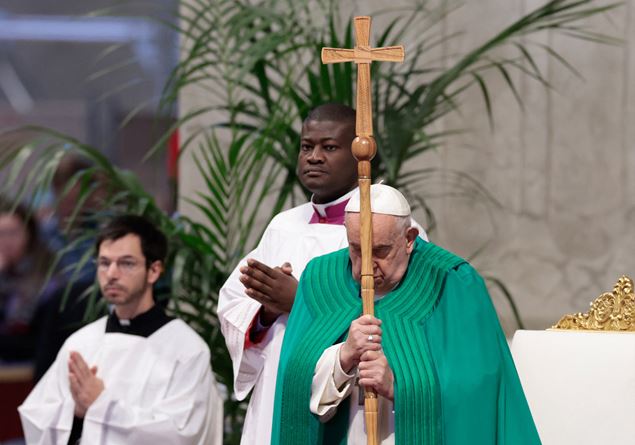
“I say it to the Church, I say it to the State Governments and international organizations, I say it to each and everyone: please, let’s not forget the poor.” Pope Francis, on the Day dedicated to the last, reminds us that, in the darkest hours, God comes close to save us. «In the anguish of our hearts and of our time, there is an unshakable hope, an unshakable hope that shines», he explains and invites, «on this World Day of the Poor» to focus «on these two realities: anguish and hope , who always challenge each other to a duel in the field of our heart. First of all the anguish. It is a widespread feeling in our era, where social communication amplifies problems and wounds, making the world more insecure and the future more uncertain.” Today’s Gospel opens with a disturbing picture: «It does so using apocalyptic language: “The sun will darken, the moon will no longer give its light, the stars will fall and so on…”. If our gaze stops only at the news of the facts”, says Francis, “the anguish gets the upper hand within us. Even today, in fact, we see the sun darken and the moon go out, we see the hunger, the famine that oppresses so many brothers and sisters who have nothing to eat, we see the horrors of war and the innocent deaths; and, faced with this scenario, we run the risk of sinking into discouragement and not realizing the presence of God within the drama of history. Thus, we condemn ourselves to impotence; we see the injustice growing around us that causes the pain of the poor, but we join the resigned current of those who, out of convenience or laziness, think that “the world is like this” and “I can’t do anything about it”. Then even the Christian faith itself is reduced to a harmless devotion, which does not disturb the powers of this world and does not generate a concrete commitment to charity. And while a part of the world is condemned to live in the slums of history, while inequalities grow and the economy penalizes the weakest, while society devotes itself to the idolatry of money and consumption, it happens that the poor and the excluded do not they can do nothing but keep waiting, keep waiting.”
But Jesus, in the midst of this apocalyptic picture, «kindles hope. It opens up the horizon, broadens our gaze so that we learn to grasp, even in the precariousness and pain of the world, the presence of the love of God who comes close, who does not abandon us, who acts for our salvation. In fact, just as the sun darkens and the moon stops shining and the stars fall from the sky, says the Gospel, “they will see the Son of man coming on the clouds with great power and glory”; and He will “gather together his elect from the four winds, from the ends of the earth to the ends of the heavens”».
Jesus speaks of his death which will occur shortly thereafter, when, on Calvary, «the sun will darken and darkness will descend on the world; but precisely at that moment the Son of Man will come on the clouds, because the power of his resurrection will break the chains of death, the eternal life of God will rise from the darkness and a new world will be born from the rubble of a history wounded by evil.”
The very image of the fig tree, remembered in the Gospel, tells us about this hope. When the branch that seems dry becomes tender and the leaves appear “” it means that summer is near”. In the same way, we too are called to read the situations of our earthly life: where there seems to be only injustice, pain and poverty, precisely in that dramatic moment, the Lord comes close. He comes close to free us from slavery and makes his life shine and he comes close with our Christian closeness, with our Christian brotherhood.” But «it is not a question», says the Pope, «of throwing a coin into the hands of those who need it. I ask the person who gives alms two things: “Do you touch people’s hands or do you throw away the coin without touching them? Do you look into the eyes of the person you are helping or do you look away?” It is we, his disciples, who thanks to the Holy Spirit can sow this hope in the world. We are the ones who can and must turn on the lights of justice and solidarity while the shadows of a closed world gather. It is we who his Grace makes shine, it is our life mixed with compassion and charity that becomes a sign of the presence of the Lord, always close to the suffering of the poor, to soothe their wounds and change their fate.”
We must remember that the Kingdom is realized through us and that there is a need for “our commitment, an active faith in charity, Christians who do not look the other way”. The Pontiff talks about a photo he looked at some time ago. «A photograph taken by a Roman photographer: an adult, almost elderly couple was leaving a restaurant in winter. The lady well covered with fur and the man as well. And at the door there was a poor lady lying on the floor begging and they were both looking the other way. This happens every day. Let’s ask ourselves: “Do I look the other way when I see the need, the poverty, the pain of others?” Because looking at the poor and the suffering of the world means having the same “compassion as Christ. Do I feel the same compassion towards the poor, towards those who have no work, who have nothing to eat, who are marginalized by society? And we must not only look at the great problems of global poverty, but at the little that we can all do every day: with our lifestyles, with attention and care for the environment in which we live, with the tenacious search for justice , with the sharing of our goods with those who are poorer, with the social and political commitment to improve the reality around us. It may seem like little to us, but our little will be like the first leaves that emerge on the fig tree: our little will be a foretaste of the summer that is now approaching.”
And finally, “on this World Day of the Poor”, Francis recalls the words of Cardinal Martini. «He said that we must be careful to think that there is first the Church, already solid in itself, and then the poor we choose to care for. In reality, we become the Church of Jesus to the extent that we serve the poor, because only in this way “the Church “becomes” itself, that is, a house open to all, a place of God’s compassion for the life of every man”.







